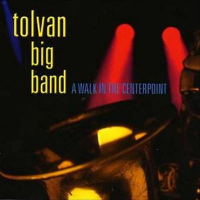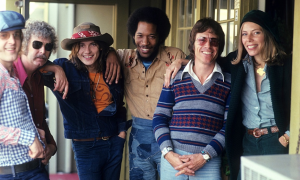Home » Jazz Articles » Profile » Meet Carmine D'Amico
Meet Carmine D'Amico
 Carmine D'Amico is a studio and performance musician whose outstanding musical legacy and credits are too numerous to cover totally in this brief biographical sketch. I was fortunate to meet and get to know him through his association with my oldest brother, Richie Pratt. Carmine and Richie are still great friends and worked together often on various sessions in New York. Interacting with Carmine D'Amico is like getting a master class about the life of a musician. This is a two part musing, with the first part featuring Carmine's background. The second part will contain the artist interview questions and Carmine's quoted answers.
Carmine D'Amico is a studio and performance musician whose outstanding musical legacy and credits are too numerous to cover totally in this brief biographical sketch. I was fortunate to meet and get to know him through his association with my oldest brother, Richie Pratt. Carmine and Richie are still great friends and worked together often on various sessions in New York. Interacting with Carmine D'Amico is like getting a master class about the life of a musician. This is a two part musing, with the first part featuring Carmine's background. The second part will contain the artist interview questions and Carmine's quoted answers. About Carmine
His skills have been showcased on stage, on records, in movie and television soundtracks, and on commercials that most of us have heard and taken for granted. As a multi-Grammy winner, Carmine represents "THE school" of music, in which the ability to successfully play one's part has been the key to outstanding performance. In today's music world, where it is sometimes sufficient to merely know a few chords and licks in order to make a recording, Carmine stands out as a true student of music and an incredible talent whose flexibility and ability are legendary!
The Early Years
"...Make each note a diamond." That's what his father, Joseph D'Amico, said to him when he was seven years old. He gave Carmine the choice of playing either the piano or the guitar. Carmine has never forgotten those words. The senior D'Amico also told him not to be concerned about how many notes he played when he would solo, but that each note must have meaning. He would sit with Carmine every night, teaching him various musical styles, reading skills, guiding him, and encouraging him to be the best musician he could be. Joe D'Amico was a perfectionist and he instilled that quality in Carmine. Sometimes it's a burden, but it's always motivating. At age 9, Carmine recorded "Who Wears Short Shorts," and it became a big hit. He was then signed to Capitol Records and went on tour. Performances included American Bandstand with Dick Clark, The Allen Fried Show, Soul Train, as well as concerts. Carmine ultimately wound up doing '50s hit records at the ages of 9, 10, and 11 with the Shirelles, Connie Francis, Fabian, Frankie Avalon, and others. When Carmine was in school, he won Academic scholarships to both high school and college. He graduated valedictorian of Trinity High School with a 99.9 average. Carmine found himself pre-med because his father was not confident that anyone could make a living in the music business. Carmine's father wanted him to be a doctor. However, when his professors found the young man composing songs during his classes, they suggested that he do what really made him happy - music. With his father's blessings, Carmine left medical school, transferred to Queens College and majored in music. Despite the fact that he could not attend classes regularly, as he was touring with a variety of performers including - Tammy Grimes, Liza Minelli and Ed Ames, Carmine nonetheless managed to graduate with an "A" average, and received his B.A. in Music Education.
Military Bands
Upon graduating college during the Viet Nam era, Carmine's military service eligibility status immediately changed to a "1-A" draft classification. He entered military service and was accepted into an assignment with a special Army Dance Band. He had no idea that he was going to be stationed in Viet Nam and Guam; or, that he would be working with Bob Hope and a wide variety of other performers supporting troop morale via USO shows. Carmine returned to New York upon honorably completing his tour of duty and resumed his career activities, first joining Ed Ames.
Musician To The Stars
While with Ames, Carmine recorded with the artist on two of his biggest hits, "Try To Remember," and "My Cup Runneth Over." When Ames got called to co-host with Mike Douglas on his nationwide television show, he brought Carmine along with him. Carmine was asked to continue on the show as staff guitarist. He remained in that post for about three years. During this same period, Carmine met Emory Davis, son of society bandleader, Meyer Davis. He worked for Davis doing "society parties" all over the world. When Davis took over as contractor of the Westbury Music Fair, Carmine also worked with Bobby Darrin ("Mack, the Knife"), Sergio Franchi, Patti Austin, Englebert Humperdinck (with whom he recorded "After The Loving"), Vic Damone, Manhattan Transfer, Shirley Maclaine, Henry Mancini, Michele Legrande, Bernadette Peters, The Pointer Sisters, The O'Jays, Jack Jones, Lainie Kazan, Elisa Kashi, and Connie Francis. As you see, Carmine has had the great fortune of working with many of the finest musicians in the world, most commonly known among these include: Bernard Purdie, Steve Gadd, Ron Carter, John Faddis, Lou Marini, Lionel Hampton, Teo Macero, Bob Cranshaw, Tom Barney, John Frosk, Doc Severinsen, Jack French, Angelo Baddalemente (composer of the theme song for the TV show "Twin Peaks"), Vinnie Bell, Keith Loving, Tom Malone, John Tropea, Elliott Randall, Boris Kozlow (leader of "The New Charlie Mingus Big Band"), Michael Hinton, and his favorite, Chris D'Amico, Carmine's late brother and bassist to the stars, and so many other fine musicians too numerous to name.
The Hits Keep Coming
Another string of successful projects seemed to begin when Carmine's old friend, Teddy Randazzo, called him for an album for Walter Murphy, called A Fifth Of Beethoven. Through Teddy and Walter Murphy, Carmine wound up playing guitar on all of the musical selections recorded for Saturday Night Fever with the Bee Gees. Murphy also called Carmine to play for the movie, "Killer Bees." Randazzo called Carmine to play on two albums with the Stylistics which included hits such as: "You Make Me Feel Brand New," and "Betcha' By Golly Wow". Carmine also did albums with Eric Carman and Peter Lemongello. After an introduction to Lou Tobie by Randazzo, Carmine did four albums with Ray, Goodman and Brown. Those sessions included the hits: "You Gotta' Be A Special Lady," "Happy Anniversary To You." and "Inside Of You," all of which were also co-produced by Barbara Baker (wife of Mickey Baker of Mickey and Sylvia "Love Is Strange" fame) and Vinnie Castellano. Continuing with Tobie, Carmine also recorded albums with Stephanie Mills, Vanessa Williams, Patti LaBelle, Freyda Payne, Tina Turner, Ben Vereen and played on all of the Sugar Hill Productions, the later being known as the "Motown of New York." Carmine's old Queens College schoolmate, Marvin Hamlisch, composer of "Chorus Line" and the theme song from the movie "Ice Castles," called Carmine to do a concert tour with him. This opportunity led to Carmine directly working in the traditional Jazz arena with Mel Torme, along with Mel Lewis and Thad Jones. He also recorded several albums with both, Mel Torme and the Thad Jones/Mel Lewis Band. In the same period, Tony Cabot, bandleader for the Rainbow Room at the Top of the Sixes, introduced Carmine to John Dankworth, who is the saxophonist, clarinetist, and husband of singer, Cleo Laine. Carmine played the concert at Carnegie Hall, which was also recorded live and won a Grammy for "Best Jazz Album of the Year"(Cleo Lane live at Carnie Hall).
At the same time, Carmine was doing various concerts with Shirley Bassey, Ben Vereen, Josephine Baker, and was ultimately introduced to the maestro, Leonard Bernstein, who was then conductor of the New York Philharmonic. Carmine was asked by the composer to play guitar on Leonard Bernstein's Mass, which was also recorded live at the Kennedy Center in Washington, D.C.
Television, Film and Jingles
Judy Hart Angelo, composer of the theme for the TV show "Cheers," called Carmine to play for the recording of the show's main theme and incidental music. Carmine also played guitar on and off camera for the "Kate and Ali Show," which was being videotaped live from the Ed Sullivan Theater in NYC. Angelo DiPippo, arranger and accordionist, called Carmine to play mandolin and guitar in the movie (the wedding scene) and for the soundtrack of "The Godfather I," along with albums for Rodney Dangerfield, Dom DeLuise, James Darren, Jimmy Roselli (along with Shelly Mann and George Duvivier), Al Martino, Julius LaRosa, Tony Bennett, Mary Costa, Jan Pierce, and Trini Lopez. This active recording period found Carmine doing performances for the recording of thousands of TV and radio commercials, such as: Miller Beer, Coca-Cola, Pepsi Cola, Budweiser, Kodak, 7-Eleven, Oscar Meyer, Tuscan Farms (with Buddy Hackett), etc.
Composer and Arranger
With Yarone Gershovsky, the conductor, arranger and pianist for Manhattan Transfer, Carmine co-wrote two episodes of "The Equalizer" for television. He also wrote two original compositions for commercials advertising the Snapple beverages, and wrote assorted compositions for MUSAK as well. During this prolific period and seemingly height of opportunities for working musicians, the National Academy of Recording Arts and Sciences (NARAS -Grammy), also voted Carmine "Most Valuable Guitar Player" in both 1986 and 1987.
Today, Carmine D'Amico continues performing, producing, composing, arranging and recording for a variety of musical artists. His latest solo release is titled, The Carmine D'Amico Ensemble, and features his talented and lovely wife, Ronee - whom Carmine openly acknowledges as his inspiration, on vocals.
Tags
PREVIOUS / NEXT
Support All About Jazz
 All About Jazz has been a pillar of jazz since 1995, championing it as an art form and, more importantly, supporting the musicians who make it. Our enduring commitment has made "AAJ" one of the most culturally important websites of its kind, read by hundreds of thousands of fans, musicians and industry figures every month.
All About Jazz has been a pillar of jazz since 1995, championing it as an art form and, more importantly, supporting the musicians who make it. Our enduring commitment has made "AAJ" one of the most culturally important websites of its kind, read by hundreds of thousands of fans, musicians and industry figures every month.























